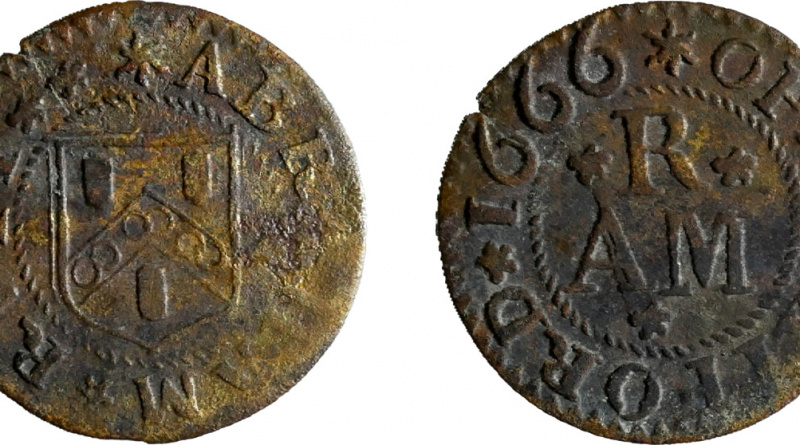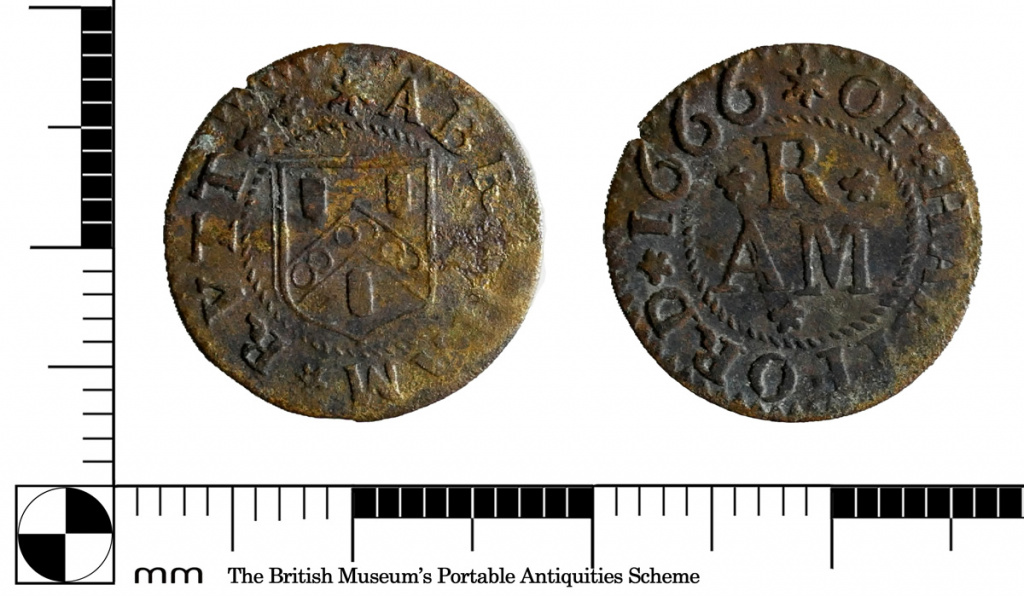PAS Finds (w/e 28/07/23) – Rutt and the Quakers
My selection of the detecting finds recorded at the PAS in the week ending 28 July 2023.
Featured Find
Farthing token of Abraham Rutt
A farthing token of Abraham Rutt, dated 1666. Only four years before he was languishing in prison, facing personal and financial ruin.
Abraham Rutt
Abraham was born in 1618. The token tells us his main occupation. On the obverse is the crest of the Worshipful Company of Ironmongers and on the reverse the legend reads “OF HARTFORD”. However, Abraham was not only a ironmonger in Hartford, he was a pillar of society. He was made a freeman of Hertford in 1643, elected a constable a year later, assistant burgess (or town councillor) in 1646 and “scrutator strata” (highway surveyor) in 1647.1 He was also put in charge of collecting tolls on the river Lea2, a vital navigation route to London.
All was going well in Abraham’s life. He only had to wait for a vacancy for one of the ten Chief Burgesses and he would have been set for life. The problem was that they served for for life unless incapacitated by infirmity, mischance or misdemeanour, or by voluntary resignation.3 Two things combined to lead to Abrahams fall from grace: he had become a Quaker and in 1660 came the Restoration of the Monarchy.
Quaker
The Religious Society of Friends was formed by George Fox during the English Civil War. It’s main principles were that people could communicate with God directly and didn’t need intermediaries such as priests and the established church. Everyone was considered equal, regardless of gender or social status.
In 1650, George had his first brush with the law in Derby. According to his autobiography, it was there that Justice Bennet “was the first that called us Quakers, because I bade them tremble at the word of the Lord“4 The term Quaker was meant as a term of ridicule but was enthusiastically adopted by the followers.
Refusal to take oaths
George Fox was no stranger to prison and in 1663 he found himself in prison again for refusing to swear an oath of allegiance to the new king.
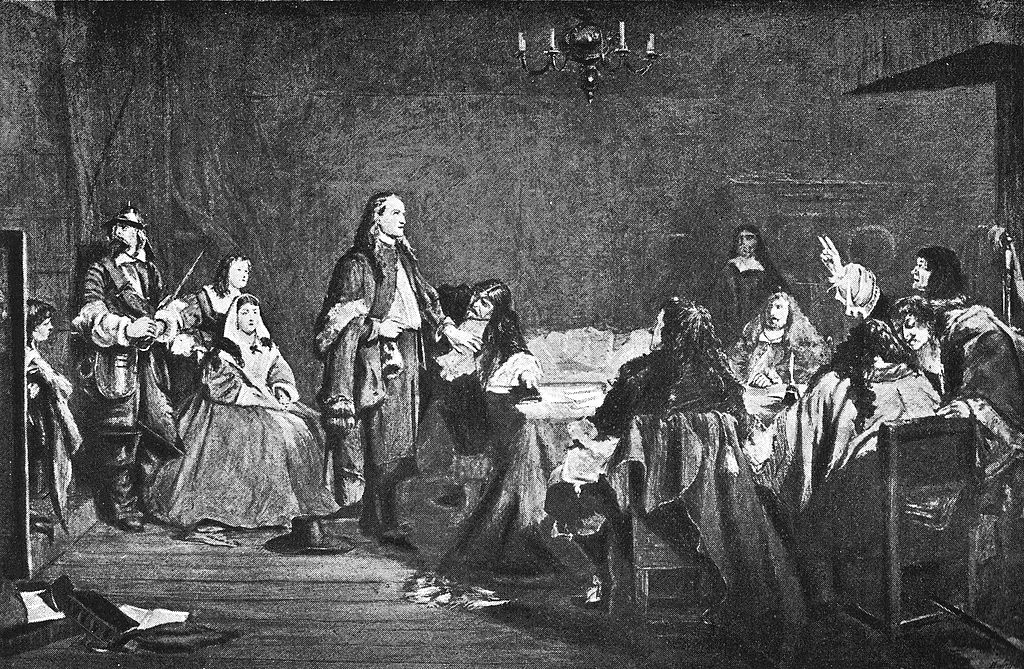
Painting by John Pettie, 1892
Quakers refused to take oaths, following the words in the Bible of Matthew 5:34-37
“But I say to you, Do not swear at all, either by heaven, for it is the throne of God, or by the earth…Let your word be ‘Yes, Yes’ or ‘No, No’; anything more than this comes from the evil one.“
Restoration of the Monarchy
In 1660, the Restoration of the monarchy saw Charles II return from exile in Europe.
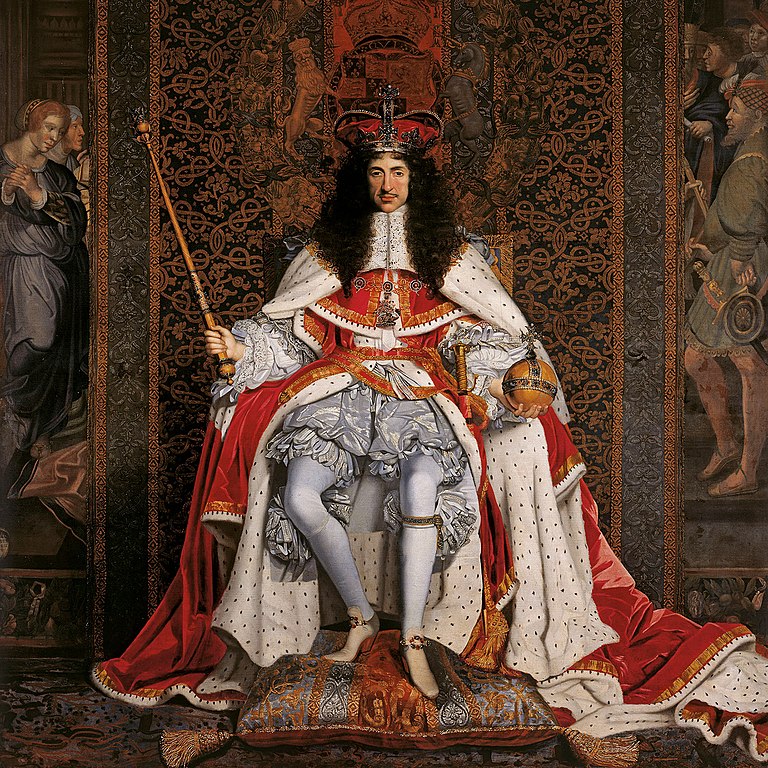
His Declaration of Breda, dated 4 April of that year, promised, amongst other things, a pardon for crimes committed during the Civil War for all those that recognised him as the lawful king and religious toleration.
This led to Parliament passing a series of Acts in 1661 which became known as the Clarendon Code, after Edward Hyde, Earl of Clarendon.
The promise of religious tolerance had been forgotten. The Code required municipal officials to take Anglican communion, enforced the use of the 1662 Book of Common Prayer and forbade meetings of more than five people of other religious groups.
Quaker Act
The Quaker Act of 1662 (or to give it its full title: An Act for preventing the Mischeifs and Dangers that may arise by certaine Persons called Quakers and others refusing to take lawfull Oaths) required subjects to swear an oath of allegiance to the king.
This was the trap that saw many Quakers end up in prison or even face transportation. The existing laws required some transgression to be proved but now a Quaker could simply be asked to swear an oath in court and, when he refused, declared guilty.
Hertford Quakers
The Restoration of Charles II was not enthusiastically celebrated in Hertford, spending just four shillings on the event (compared to St Albans spend of £3.11s0d3 ). Many on the Council could see which way the wind was blowing and feared for the worse.
In October 1662, Abraham along with three other Quakers were brought before the County Sessions on a charge of not attending the parish church, which they were required to do at least once a year as Council members. According to a letter from the four in jail, it was decided that they were “a people too mighty for them to deal with” and they were transferred to the County Justices.5 The charge was dropped in favour of demanding they swear the oath to the king. They refused and “were returned to prison, and close confined during a sharp winter, whereby their health was much impaired“6 An order was also prepared for all their land and possessions to be confiscated.
They spent 31 weeks in prison until on 5 May 1663, the king granted them their freedom and allowed them to keep their property. Their release may have been due to pragmatism by Hertford Council. Quaker beliefs were strong in the town and these were all prominent business people. To avoid economic suicide, the Council appears to have been prepared to accept affirmation, rather than swearing, from Quakers.7
As the token from 1666 shows, Abraham returned to his former trade as an ironmonger. He died in 1685.
Hertford Quaker meeting house
There must have been sufficient confidence in the Hertford Quaker community by 1670 as they decided to spend £243 12S on a meeting house. It was certainly a testimony to their faith as seven of the eleven leading contributors were in prison at the time.8
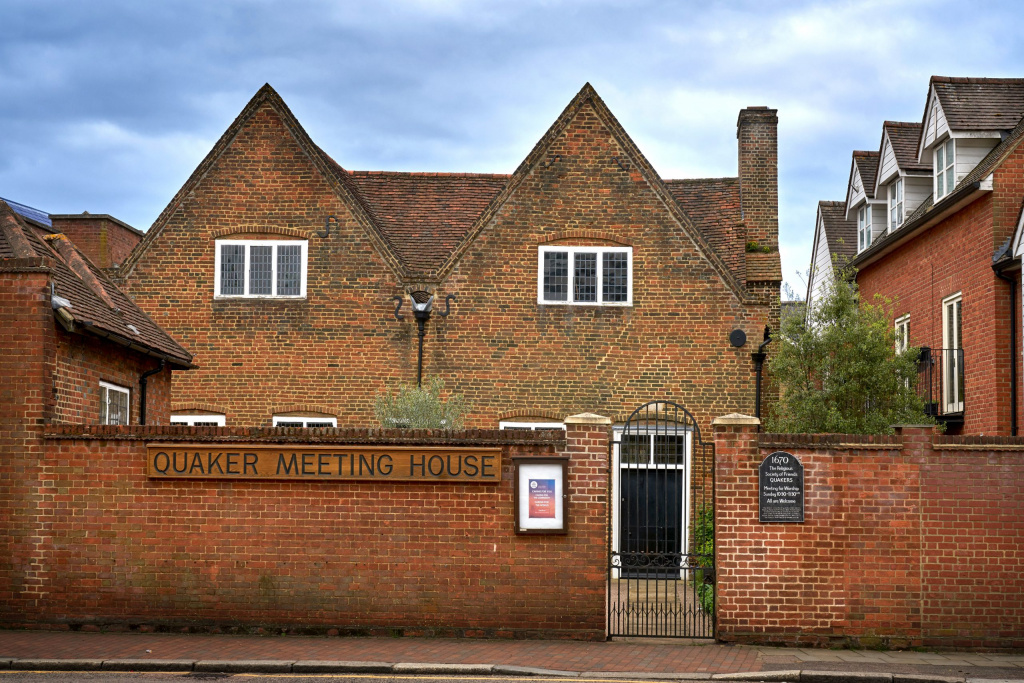
The land was transferred by a Quaker tailor, Edward Parkin, who had been sentenced to transportation to Barbados in 1665 (possibly not carried out).
It is the oldest Quaker meeting house in the world still in continuous use.
It wasn’t until the 1689 Toleration Act that the persecution of Quakers would be reduced in law.
Honest and Integrity
It seems a high price that the early Quakers paid for their principled position on honest and integrity. These qualities, along with treating workers fairly, were the hallmark of later successful Quaker businessmen like Cadbury, Rowntree and Fry.
References
- Trade tokens in the Seventeenth Century In ENGLAND, WALES, AND IRELAND, BY CORPORATIONS, MERCHANTS, TRADESMEN, By George C. Williamson, 1889
- The River Lea 1571-1767, Chapter 10, by Keith Roland Fairclough, 1986
- PURGING HERTFORD CORPORATION by Alan Greening
- George Fox, An Autobiography
- A BRIEF RELATION OF THE Persecutions and Cruelties That have been acted upon the PEOPLE CALLED QUAKERS, 1662
- A Collection of the Sufferings of the People Called Quakers, p253, by Joseph Besse
- Hertfordshire in History: Papers Presented to Lionel Munby p189
- NEW LIFE FOR AN OLD MEETINGHOUSE by Violet Rowe, 1979
- Hertford County Records

